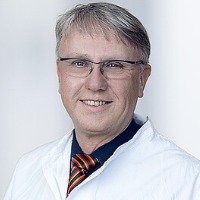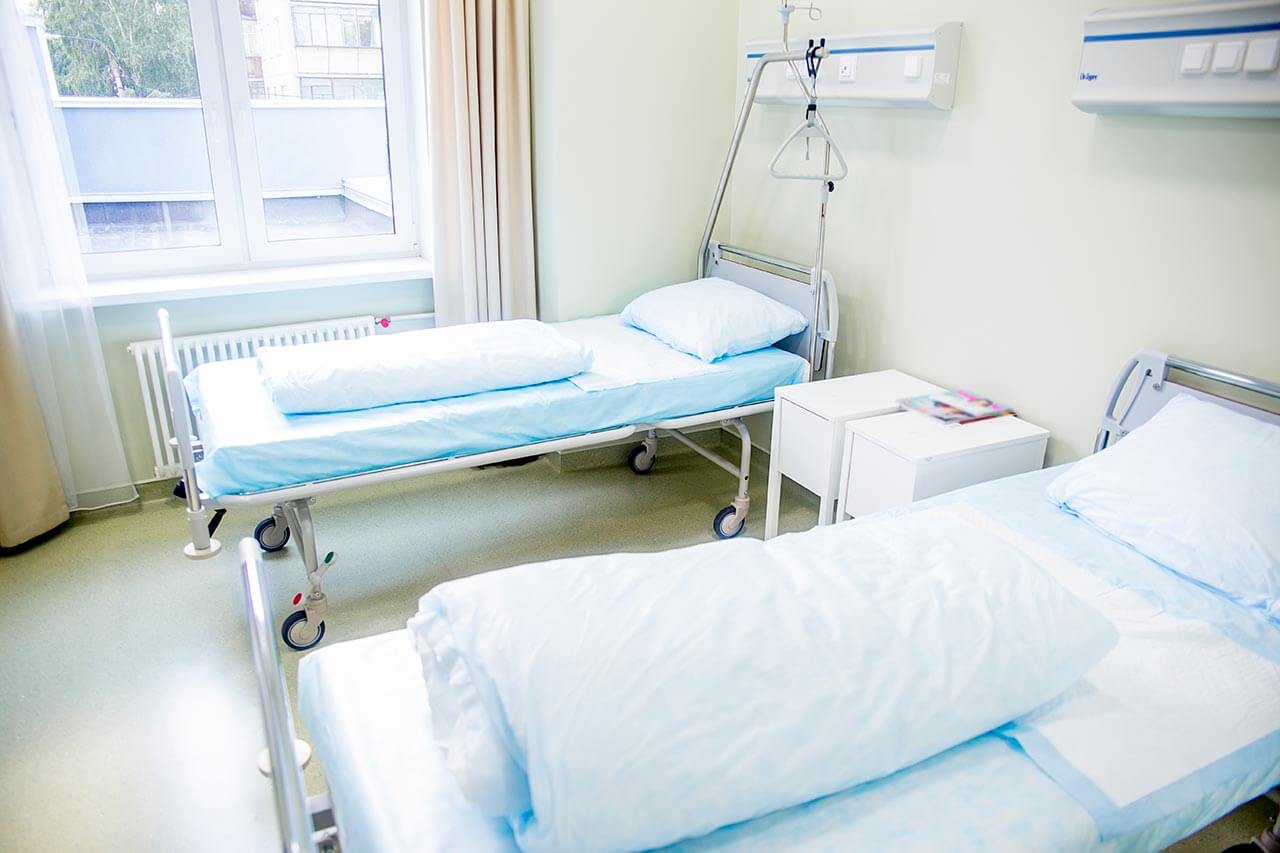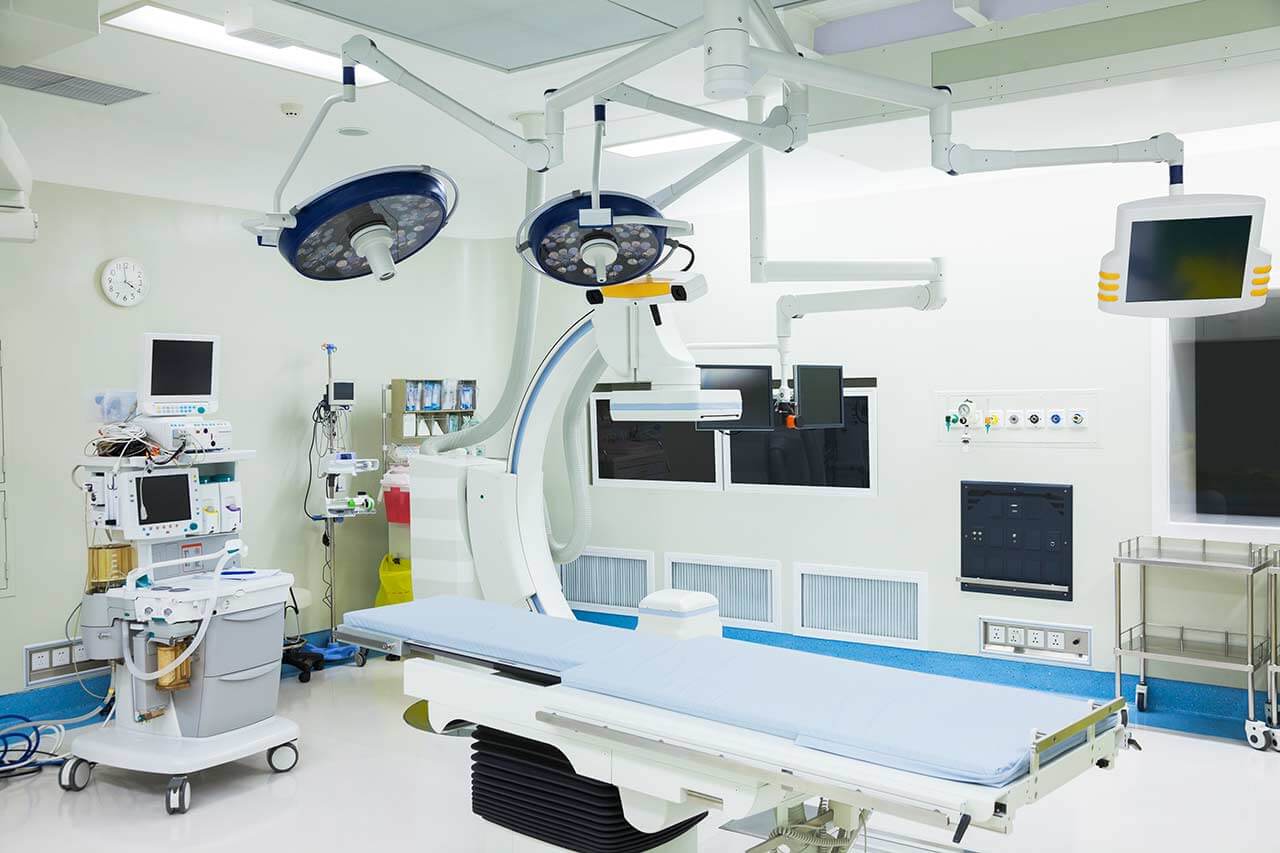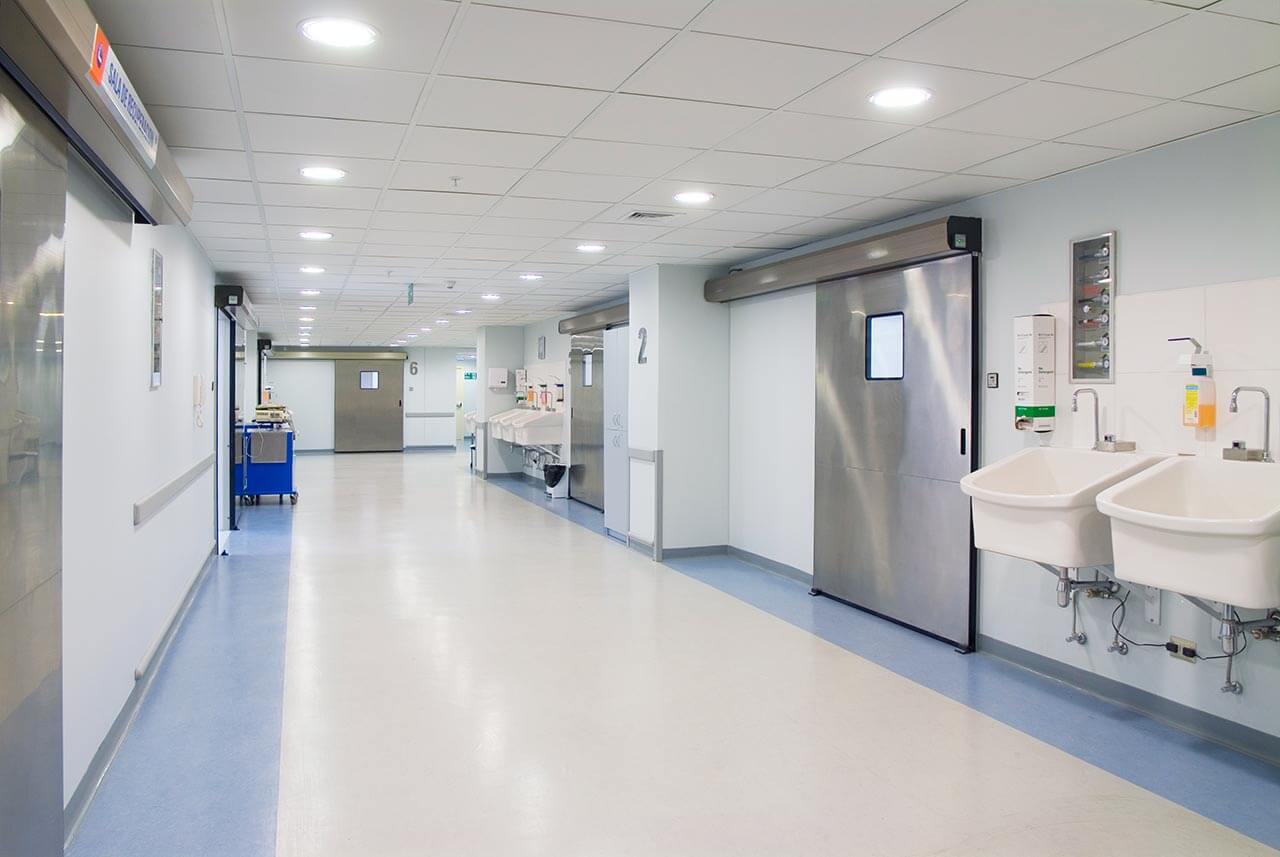
The program includes:
- Initial presentation in the clinic
- clinical history taking
- physical examination
- review of medical records
- laboratory tests:
- complete blood count
- general urine analysis
- differential blood analysis
- biochemical analysis of blood
- TSH-basal, fT3, fT4
- tumor markers
- indicators of inflammation
- indicators of blood coagulation
- chest X-ray
- abdominal ultrasound scan
- CT of the neck, chest and abdomen
- bone marrow biopsy with histological analysis
- 1 course of chemotherapy
- symptomatic treatment
- control examinations
- cost of essential medicines and materials
- nursing services
- full hospital accommodation
- explanation of future recommendations
How program is carried out
During the first visit, the doctor will conduct a clinical examination and go through the results of previous laboratory tests and instrumental examinations. After that, you will undergo an additional examination, including laboratory assessment of liver and kidney function, ultrasound scan. Based on the received results, the doctor will elaborate the chemotherapy regimen. If necessary, related medical specialists will be involved in the elaboration of a treatment regimen (tumor board).
Chemotherapy is carried out as the inpatient procedure, with mandatory admission to the hospital. After the placement of a venous catheter, you will stay in a comfortable ward. An infusion system will be connected to the catheter, through which the required drug or a drug combination will be administered. All drugs are administered by intravenous drip, slowly, so the total duration of the infusion can be up to several hours. All this time, doctors and nurses will monitor your health condition closely.
After the course of chemotherapy, you will stay under medical supervision in the ward for a few more hours. After the completion of the chemotherapy course and control examinations you will receive the medical report with detailed recommendations regarding further treatment. In the future, you will be able to have a distant consultation with your attending physician and schedule the next course of chemotherapy, if necessary.
Required documents
- Medical records
- MRI/CT scan (not older than 3 months)
- Biopsy results (if available)
Service
You may also book:
 BookingHealth Price from:
BookingHealth Price from:
About the department
The Department of Oncology and Hematology at the University Hospital Oldenburg offers a full range of medical services in its areas of expertise. The medical facility diagnoses and treats solid malignant tumors and benign and malignant diseases of the hematopoietic system. The department's therapeutic options include both standard and innovative treatment methods. The medical facility successfully uses chemotherapy, immunotherapy, hormone therapy, targeted therapy, antibody therapy, and other therapeutic measures. The medical facility also has gained extensive experience in the field of autologous and allogeneic bone marrow transplantation. The department's specialists participate in numerous national and international clinical trials, which allows them to offer patients more therapeutic modalities. The department's oncologists closely cooperate with doctors of related specialties, including radiation therapists, radiologists, surgeons, gastroenterologists, gynecologists, urologists, etc. In 2020, the department was certified according to the standards of the German Cancer Society (DKG), and in 2019 received the international JACIE accreditation in the field of bone marrow transplantation. In most cases, patients of the department are treated on an outpatient basis. The department is headed by Prof. Dr. med. Claus Henning Köhne.
Treatment begins with a comprehensive examination and individual consultations. The doctors of the department have at their disposal many effective methods of treating oncological diseases. In the field of oncology, an individual approach and development of a treatment regimen in accordance with a specific clinical case are of crucial importance. The method of treatment is determined in interdisciplinary consultations, in which oncologists, surgeons, radiologists, radiotherapists, and other specialists participate. In most cases, surgery to remove the tumor is the first-line treatment. Thanks to modern surgical techniques and improved technologies, many operations are performed using minimally invasive techniques, which contributes to the fastest postoperative recovery and minimal pain. However, surgery may not be enough, so in some cases surgical treatment is supplemented with chemotherapy, including high-dose chemotherapy, immunotherapy, radiation therapy, targeted therapy, or antibody therapy. In the case of incurable oncological diseases, the specialists of the department perform palliative therapy, the purpose of which is to prevent complications and provide the patient with a satisfactory quality of life.
In the field of hematology, the department offers treatment for a wide range of benign and malignant diseases of the blood and lymphatic system, including blood clotting disorders. The main method of treating blood cancer is classical or high-dose chemotherapy. High-dose chemotherapy is used when the chances of recovery with standard chemotherapy are quite low. This type of chemotherapy has a number of side effects, but provides a high chance of recovery. In complex clinical situations, doctors perform autologous or allogeneic bone marrow transplantation in combination with high-dose chemotherapy.
The diagnosis of oncology is usually a strong emotional shock for the patient, which not everyone can cope with on their own. The department offers help from qualified psychologists: specialists work on the patient's fears about the upcoming treatment and help them to prepare for the fight against cancer and a positive treatment outcome. The psycho-emotional state of the patient also plays an important role in the success of treatment.
The department specializes in the diagnosis and treatment of the following diseases:
- Oncology
- Skin tumors
- Head and neck tumors
- Bronchial tumors
- Mediastinal tumors
- Esophageal tumors
- Stomach tumors
- Pancreatic tumors
- Liver tumors
- Bile duct tumors
- Small intestine tumors and carcinoids
- Colon and rectal tumors
- Breast tumors
- Female genital tumors
- Kidney tumors
- Urinary tract tumors
- Male genital tumors
- Soft tissue sarcomas
- Connective tissue tumors
- Germ cell tumors
- Hematology
- Acute and chronic leukemias
- Benign blood diseases
- Blood clotting disorders
- Hodgkin's lymphoma
- Non-Hodgkin's lymphoma
- Other diseases
The department offers the following treatment methods:
- Chemotherapy, including high-dose chemotherapy
- Immunotherapy
- Targeted therapy
- Antibody therapy
- Hormone therapy
- Autologous and allogeneic bone marrow transplantation
- Other therapeutic services
Curriculum vitae
Higher Education
- 1978 - 1985 Medical studies at the Hannover Medical School.
- 1982 -1983 Internship, University of Glasgow, Scotland, Grant from the German Academic Exchange Service (DAAD).
Professional Career
- 1986 - 1987 Internship, Department of Cardiology and Gastroenterology, Robert Koch Clinic, Gehrden.
- 1988 - 1995 Residency, Hannover Medical School.
- 1995 - 1998 Senior Physician, Department of Hematology, Oncology and Tumor Immunology, Robert-Roessel Clinic at the Charité, Humboldt University of Berlin.
- 1998 - 2001 Senior Physician, Department of Internal Medicine, Section of Hematology and Oncology, University Hospital Rostock.
- 2001 - 2004 C3 Professorship, Internal Medicine (focus on oncology), Department of Internal Medicine I, University Hospital Carl Gustav Carus, Technical University of Dresden.
- Since 2004 Head Physician, Department of Oncology and Hematology, University Hospital Oldenburg.
Qualifications
- 1985 Admission to medical practice.
- 1995 Board certification in Internal Medicine.
- 1995 Board certification in Hematology and Oncology.
- 1995 Examinations of the European Society for Medical Oncology (ESMO) in oncology.
- 2000 PD in Internal Medicine, University of Rostock.
Memberships in Professional Societies
- American Association for Cancer Research (AACR).
- Working Group for Internal Oncology (AIO).
- American Society of Clinical Oncology (ASCO).
- German Cancer Society (DKG).
- German Society of Hematology and Medical Oncology (DGHO).
- Working Group for Gastroenterology of the European Organization for Research and Treatment of Cancer (EORTC).
- European Society for Medical Oncology (ESMO).
- International Society of Geriatric Oncology (SIOG).
Collaboration in Scientific Committees and Professional Societies
- Founding Member of the PETACC Pancreatic Cancer Programme.
- Coordinator of the PETACC 2 study.
- Coordinator of studies no. 40952, 40986, 40015, European Organisation for Research and Treatment of Cancer (EORTC).
- Secretary of the Working Group for Gastroenterology, EORTC (2001 - 2007).
- Member of the Editorial Board of the Annals of Oncology.
- Advisor to the European Medicines Evaluation Agency, London.
- Advisor to the AQUA Institute for Quality Improvement and Research in Healthcare, Goettingen.
Photo of the doctor: (c) Klinikum Oldenburg AöR
About hospital
The University Hospital Oldenburg is a multidisciplinary medical complex offering top-notch services of the European standard. The hospital has 20 specialized departments, 15 highly specialized centers, and more than 10 institutes. The hospital provides services in almost all areas of modern medicine: general and abdominal surgery, cardiac surgery, orthopedics, traumatology, cardiology, oncology, dermatology, gastroenterology, gynecology, mammology, urology, and pediatric and adolescent medicine.
The hospital has 832 beds, and many diagnostic and therapeutic procedures are performed on an outpatient basis. More than 150,000 patients are treated here annually, 37,000 of them receive medical care in a hospital setting. The medical complex has a highly professional medical team of more than 2,900 employees and most departments are headed by professors with extensive clinical experience.
The hospital is home to one of the best comprehensive cancer centers in Germany (Nordwestdeutsches Tumorzentrum), certified according to the requirements of the German Cancer Society (DKG). The center successfully treats breast cancer, prostate cancer, colorectal cancer, pancreatic cancer, esophageal cancer, head and neck tumors, skin tumors, and other oncological diseases. The center uses modern cancer treatment methods with proven effectiveness and also offers allogeneic and autologous bone marrow transplantation for the treatment of severe hematologic diseases (European certification JACIE).
The University Hospital Oldenburg is an expert medical facility in robotic surgery. The hospital has a specialized da Vinci Surgery Center, where gastrointestinal, urological, and gynecological diseases are treated with excellence. Patients are operated on by highly qualified professors with in-depth expertise and extensive experience in robotic surgery.
The University Hospital Oldenburg is one of the leading medical institutions in Germany because it offers excellent medical and technical resources, qualified personnel, and a comfortable infrastructure designed with the needs of patients in mind. The hospital's physicians treat patients with complex clinical cases and achieve incredible results.
The basis of medical care in the hospital is humane attitude to the patient, empathy and understanding of his needs. During the therapeutic process, the patient is surrounded by care and, if necessary, receives professional psychological support.
Photo: (с) depositphotos
Accommodation in hospital
Patients rooms
The patients at the University Hospital Oldenburg stay in comfortable single, double, and triple rooms. Each patient room has an ensuite bathroom with a toilet and a shower. The patient rooms have a TV, a telephone, and Wi-Fi. The patient rooms in the pediatric departments are designed in an appropriate interior to make the young patients feel as comfortable as possible. A child can stay in the same room with one of the parents.
The hospital has an excellent infrastructure: there is a pharmacy, a hairdresser, an ATM, and a library with audio books, DVD movies, and board games.
Meals and Menus
The hospital offers delicious and balanced meals three times a day: breakfast, lunch, and dinner. Since 2022, a new menu "Vitalessen" has been introduced here, which excludes the addition of preservatives, dyes, and flavor enhancers to food. The menu takes into account all preferences and wishes of the patients.
There is also a cozy cafe in the hospital, where you can enjoy a tasty snack or a cup of aromatic coffee or hot tea with dessert.
Further details
Standard rooms include:
![]() Toilet
Toilet
![]() Shower
Shower
![]() Wi-Fi
Wi-Fi
![]() TV
TV
Religion
There is a chapel on the ground floor of the hospital where Catholic and Evangelical services are held regularly. Services by representatives of other religions are available upon request.
Accompanying person
Your accompanying person may stay with you in your patient room or at the hotel of your choice during the inpatient program.
Hotel
You may stay at the hotel of your choice during the outpatient program. Our managers will support you for selecting the best option.




